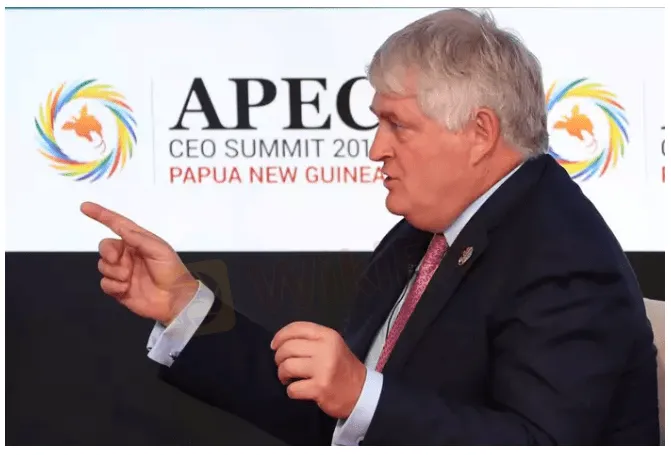简体中文
繁體中文
English
Pусский
日本語
ภาษาไทย
Tiếng Việt
Bahasa Indonesia
Español
हिन्दी
Filippiiniläinen
Français
Deutsch
Português
Türkçe
한국어
العربية
Digicel says ‘discriminatory’ Papua New Guinea tax could impact Australia buyout of Pacific mobile n
Abstract:Digicel Group said it is considering legal options after Papua New Guinea (PNG) imposed a $100 million tax that the telecoms firm said has potential “implications” for the planned A$2.1 billion ($1.57 billion) sale of the Pacific‘s biggest mobile network to Australia’s Telstra.

Telstra Corp Ltd said last October it would buy the Pacific operations of Jamaica-headquartered Digicel in a deal largely funded by the Australian government, seen by observers as a way to block Chinas rising influence in the region. The operations include 2.5 million mobile phone subscribers across PNG, Fiji, Vanuatu, Tonga, Samoa and Nauru.
Digicel‘s Irish founder, Denis O’Brien, met with PNG Prime Minister James Marape last week to try to resolve the matter, Digicel said in a statement emailed to Reuters on Monday.
It said a “new arbitrary, company-specific tax” was introduced on March 25, which was “perplexing not just for Digicel, but also for the Papua New Guinea economy given the reputational and credit rating implications of this sudden, bizarre and unprecedented tax”.
The act imposes a one-time tax liability on Digicel equal to about $100 million with a further penalty of $14 million for non-payment, the statement said.
“This matter requires urgent resolution given its implications for the sale of Digicels Pacific operations to Telstra but also given the knock-on consequences for all foreign direct investment exiting Papua New Guinea,” the statement said.
“Digicel is now engaged in discussions with the Papua New Guinea Government and other relevant stakeholders,” the statement said.
Marapes office did not immediately respond to a request for comment.
A Telstra spokesman said in an emailed statement that the PNG tax was a matter for the current owner of Digicel Pacific. In response to Reuters questions it said it was still awaiting PNG regulatory approvals for the deal.
“The acquisition of Digicel Pacific by Telstra in partnership with the Australian government has not yet received all of its regulatory approvals and has not (been) completed yet,” it said.
The tax was first flagged last November, when Papua New Guinea outlined its 2022 Budget measures. Parliament was told Digicel holds 90% of the retail mobile voice and internet market.
The tax applies only to companies who control more than 40% of PNGs market for telecommunications and banking. Bank of South Pacific, the only other company affected, told the Australian Stock Exchange on Friday the tax came into effect on March 25 and must be paid annually in September.
($1 = 1.3358 Australian dollars)

Disclaimer:
The views in this article only represent the author's personal views, and do not constitute investment advice on this platform. This platform does not guarantee the accuracy, completeness and timeliness of the information in the article, and will not be liable for any loss caused by the use of or reliance on the information in the article.
Read more

Top 10 Trading Indicators Every Forex Trader Should Know
Master the top 10 Forex trading indicators to analyze real-time Forex quotes, trends, and market signals. Learn strategies to boost accuracy and avoid mistakes.

Geopolitical Events: What They Are & Their Impact?
You've heard many times that geopolitical events have a significant impact on the Forex market. But do you know what geopolitical events are and how they affect the FX market? Let us learn about it today.

Why Do You Feel Scared During Trade Execution?
Trade execution is a pivotal moment for traders. It is when analysis turns into action, and potential profits or losses become reality. However, for many traders, this moment is accompanied by fear. Why does this happen, and how can you address it?

WikiEXPO Global Expert Interview: Simone Martin—— Exploring Financial Regulation Change
In the midst of financial innovation and regulation, WikiGlobal, the organizer of WikiEXPO, stays abreast of industry trends and conducts a series of insightful and distinctive interviews on pivotal topics. We are delighted to have the privilege of inviting Simone Martin for an in-depth conversation this time.
WikiFX Broker
Latest News
ASIC Sues Binance Australia Derivatives for Misclassifying Retail Clients
Geopolitical Events: What They Are & Their Impact?
Top 10 Trading Indicators Every Forex Trader Should Know
Why Do You Feel Scared During Trade Execution?
Revolut Leads UK Neobanks in the Digital Banking Revolution
Fusion Markets: Safe Choice or Scam to Avoid?
SEC Approves Hashdex and Franklin Crypto ETFs on Nasdaq
North Korean Hackers Steal $1.3bn in Cryptocurrency in 2024
Currency Calculator


